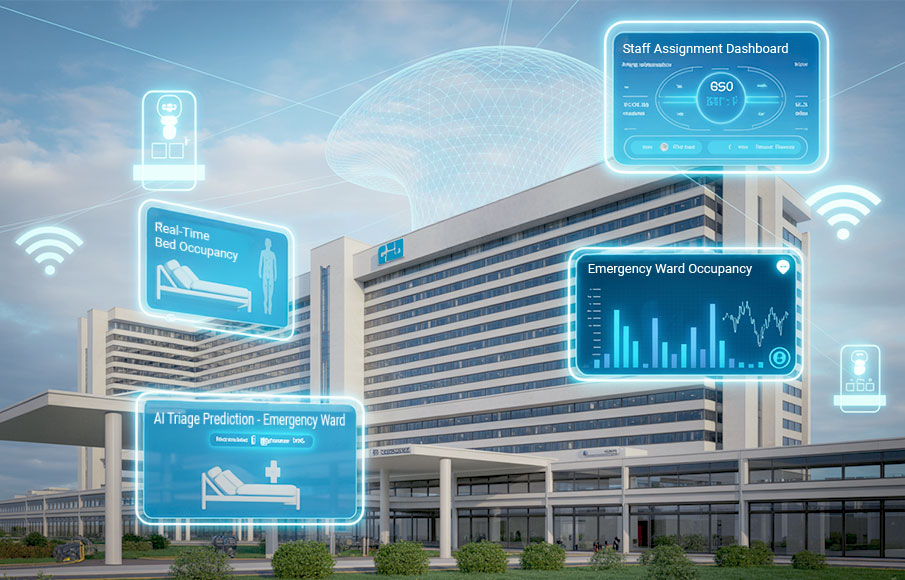What is a Firewall? 7 Things Businesses Need to Know
- 16 August 2022

Today, business operations have become much easier and faster because the Internet allows for greater interconnectivity across organisations and borders. However, this increases the rate of security breaches and threats from data attacks, making it more important than ever to have Firewalls to keep data secure and operations going.
1. What is a Firewall?

A firewall is a virtual structure built to monitor incoming and outgoing network traffic, and either permits or blocks the network connection based on a set of rules decided by the user or network administrator. This aims to protect sensitive data and prevent a virtual security breach.
Firewalls were created in the 1980s by Cisco Systems and Digital Equipment Corporation. Early firewalls had the simple task of judging packets based on their destination, source, and connection type. Gradual improvements were made to firewalls over the years with more advanced security features to support growing technologies and businesses.
Today, firewalls protect your computer and network from Distributed Denial-of-Service (DDoS) attacks, backdoors, macros, spam, remote logins, and viruses. All these harmful data are aimed at your computer or network to relieve you of control.
Unlike a virus protection program that prevents malware installation after it has entered your system, a firewall prevents the virus from entering the system in the first place. It serves as a proactive solution rather than a corrective one.
2. How Does Firewall Technology Work?

Firewalls usually protect your computer using these three main methods:
- Proxy service: The firewall comes between anything that tries to connect to your network or computer.
- Packet filtering: The firewall studies the data packets and compares them against the filters the admin has set up. If the firewall detects that the packet is among the information listed as malicious data, it is discarded quickly.
- Stateful inspection: This is similar to the packet filtering method. It compares data packets against a threat database by studying its source, ports, and associated applications.
3. Why Do Businesses Need Firewalls?
If you have not experienced an attack on your network or computer, it can be because the effects have not kicked in or you have been lucky for now. The bigger your business gets, the more likely it is to get attacked.
So, why do you need a firewall for your network? Here are some benefits of using a firewall with unified threat protection features:
- Proactive protection against spyware and virus attacks, hackers, and malware: When hackers attempt to infiltrate your network, firewalls are the first line of defence to protect against such attacks.
- Get control over content coming in through your network: Firewalls make it easy to selectively include or block website access at work. It can block malware and DoS attacks so you can rest assured that only work-related activities occur on your network.
- Work remotely without worries: When employees are accessing your corporate network from home, businesses can rest assured that remote work will not subject the organisation to threats.
4. What Are the Risks of Not Having a Firewall?
If businesses choose not to implement a firewall, security threats and breaches can result in lasting damages such as reputational and financial loss.
DDoS attacks, for example, can cause the server to expend too much power and bandwidth on services that are unrelated to your business. This makes it challenging to serve clients and can keep you offline.
Besides not having a firewall, not having the right firewall is also a problem. Basic firewall services may not offer adequate security features. This is detrimental to the business as it can breed network security issues that companies will need to spend time and resources to detect and mitigate.
5. What are the Types of Firewalls?
The two main types of firewalls in use today are hardware and virtual firewalls.
Hardware Firewalls
Hardware firewalls are physical devices built to inspect and filter inbound and outbound traffic going through your network. Companies implement these security devices to protect their network boundaries. They allow or block traffic based on a filtration system and offer security solutions, including IPS (Intrusion Prevention System) and URL filtration. Some firewall models also come with a Wi-Fi access point module.
The benefits of hardware firewalls include:
- Consistent and reliable network security
- Dedicated hardware that is not combined with a network router for better threat detection processing speed
Some drawbacks of hardware firewalls can include:
- Set up and maintenance costs
- Often difficult to install and upgrade with long lead times involved
- Requires wiring that will incur installation costs
- Protects the network only at a specific installed location; multiple locations will each require their own hardware firewall
Virtual Firewalls
Virtual firewalls, also known as cloud-based firewalls, are the perfect option for organizations where it would be impossible to deploy a physical firewall. They perform the same tasks as the hardware firewalls with some added benefits, including:
- Reduced costs associated with powering the firewall
- Easier configuration process
- Scalable, easy to upgrade
- Zero maintenance cost
- Easy integration with cloud infrastructure
- Good solution for companies with remote employees
A drawback of this is:
- Hosting within a 3rd party environment may make this solution unsuitable for organisations with stringent data encryption policies
6. How to Select the Right Type of Firewall for My Business?

Selecting the correct type of firewall for your organization will depend on many factors, including the level of security you need, budget, office space, and more. You should also factor in business expansion plans in the near future.
To match the firewall to your business needs, here are some tips:
Look out for next-generation firewalls
Next-generation firewalls (NGFW) refer to more advanced firewalls that use VPNs as well as static and dynamic packet filtering to ensure that the connections are secure and valid.
NGFW are more equipped than traditional firewalls to resist Advanced Persistent Threats (APTs) and can block out such malware from reaching the network. NGFW also promise feature convergence such as merging solutions like firewalls, antiviruses, and other security applications into a straightforward solution.
NGFWs are recommended for both SMEs and large corporations.
When selecting such solutions, it is best to work with a reliable managed service provider like SPTel to enjoy the additional benefits of cloud deployment for your cyber security needs. Your organisation will benefit from:
- Private cloud provisioning
- Flexibility and Scalability of services
- Faster set up (spin up an instance within hours)
- Easy management with a portal to monitor firewall events and generate reports
Web application firewalls
A web application firewall does a different job from a regular firewall and should be considered within your strategy as well.
The only difference is that it protects a website or web application from cyberattacks like SQL injection, cross-site forgery, file inclusion, and cross-site scripting. The web application firewall at SPTel acts as a shield between the web application and the internet.
Depending on your business’s size or growth potential, it is also common to opt for several types of firewalls. As such, businesses do not have to narrow down to just one type of firewall, and can also consider which features work best for their security and business needs.
7. What Other Security Products Do Businesses Need?
Apart from firewalls, businesses also often invest in other cybersecurity products to get the best protection from hacking, data breach, and other security issues. Some of them include:
- Antivirus and antimalware software
- Managed DDoS protection
- Email security
- Web security
- End-point security
- Domain name systems (DNS) protection
- Intrusion detection and protection
It is important to consult with a cyber security expert or with a Managed Cyber Security Services provider to find out more about your available options and how you can best defend your organisation from growing threats.
Conclusion

To ensure a high level of network security for your business, you must invest in good cybersecurity products. A simple breach in your website, network, or data security can cost your business money, private company data, employee information, and even customers.
To explore a wide range of trusted cybersecurity products for your business, check out SPTel’s Managed Security services for more information.













